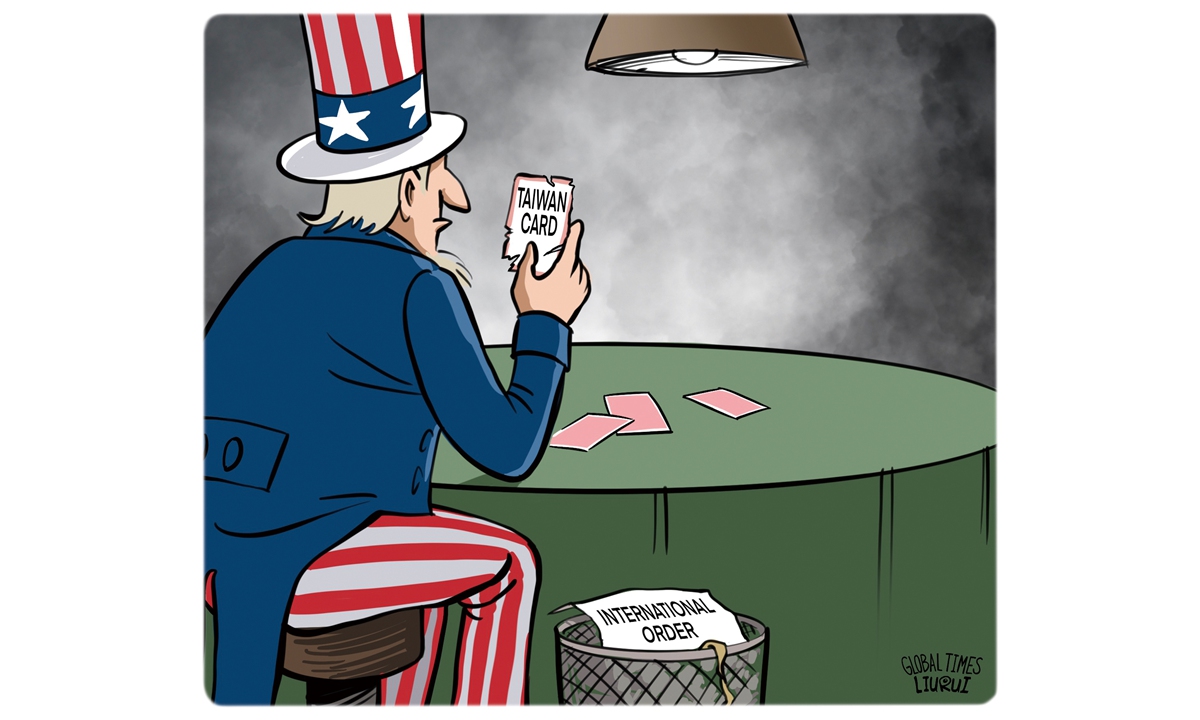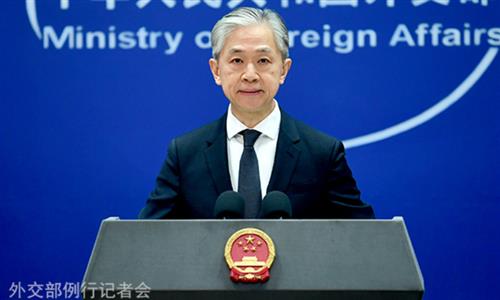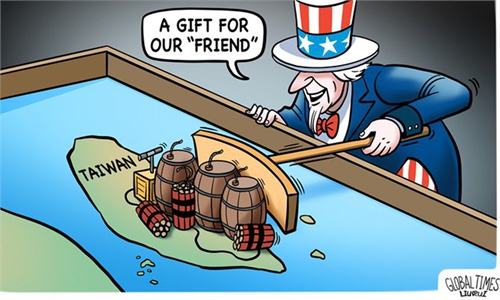
Illustration: Liu Rui/GT
Recently, the US has repeatedly distorted United Nations General Assembly (UNGA) Resolution 2758, with a clear and complete chain of collaboration among official, academic and media behind it. One key link in this chain is the report "Why UN General Assembly Resolution 2758 Does Not Establish Beijing's 'One China' Principle: A Legal Perspective." Bonnie Glaser, an American scholar on China issues and managing director of the German Marshall Fund's Indo-Pacific Program, is one of the authors.The focus of Glaser's report is twofold: First, she denies that the UNGA Resolution 2758 reflects the one-China principle, claiming that the Resolution "does not use the words 'Taiwan' or 'Republic of China,'" nor does it clearly state that "Taiwan is a part of China," or take a definite stance on "Taiwan's status." Second, she accuses the Chinese side of "mischaracterizing the contents of Resolution 2758" to restrict Taiwan's international "participation." The report attempts to evade the historical and legal fact that the Taiwan region is a part of China by using ambiguous concepts, especially by discussing the one-China principle without mentioning the Cairo Declaration and the Potsdam Proclamation, leading people to question whether Glaser and her co-author lack common sense.
Well-known scholars from both sides of the Taiwan Straits, such as Zhang Haipeng, Rao Geping, Zheng Hailin and Wu Chyung-en, have systematically analyzed and criticized such fallacies disguised as academic report, from multiple perspectives, for example, the report's attempts to negate the political authority and legal effectiveness of UNGA Resolution 2758, to sever the close connection between the resolution and the one-China principle and other harmful intentions. At the same time, they also pointed out that the report's "seemingly plausible but actually fallacious clichés" in fact originated from the old arguments of "Taiwan independence" forces.
Although this set of rhetoric is old and broken, it is still confusing and misleading to some extent. It deliberately ignores the historical background, cuts off the temporal context and distorts major complex historical, legal and political issues with isolated, static and one-sided viewpoints.
First of all, it is important to clarify how UNGA Resolution 2758 addressed the Taiwan question. Researchers familiar with modern international relations should understand that the core of the Resolution is to affirm the one-China principle within the UN system, resolve the brief "sovereignty dispute" across the Taiwan Straits that arose after the founding of the People's Republic of China (PRC) and address the issue of the status of the whole China, including the Taiwan region, within the UN.
In the form of a decision with mandatory effect, UNGA Resolution 2758 requires UN agencies and member states to confirm their political recognition of the PRC Government and to expel the representatives of Chiang Kai-shek from the UN. In the historical context, "the representatives of Chiang Kai-shek" refers to the Taiwan authorities. As a part of China, Taiwan is fully included in China's international legal status and does not enjoy separate political or legal status. It does not need to and should not be mentioned directly. Just as when the UN refers to the US, there is no need to list Hawaii alone.
UNGA Resolution 2758 explicitly and thoroughly resolved the issue of representation of the whole of China on the political, legal and procedural basis, and the issue of Taiwan's representation was also resolved accordingly. Therefore, it is misleading to claim that the Resolution only addresses the representation of the PRC, not the representation of Taiwan. In fact, while his representatives were expelled, Chiang rejected the suggestions by the US and Japan to join the UN under the name of Taiwan and upheld the view that there is one China in the world. When Ma Ying-jeou was in power, he also stressed that it is untrue to say that the Resolution does not involve Taiwan. To this day, relevant legal provisions on both sides of the Taiwan Straits clearly state that "both the mainland and Taiwan belong to one China."
Second, UNGA Resolution 2758 is part of the post-World War II (WWII) international order and power structure. Chinese Foreign Minister Wang Yi once pointed out that "in the smoky ruins of the World's Anti-Fascist War and after painful reflection, the international community established the international order and system with the United Nations as the core and the purposes and principles of the UN Charter as the cornerstone." China actively participated in this historical process. The one-China principle also formed an integral part of the post-WWII international order. This important historical background is the key to the issue that Glaser's report did not dare to face directly.
A correct view of the international order is the key to a complete and accurate understanding of the connotation of UNGA Resolution 2758. The Resolution states that "Considering the restoration of the lawful rights of the People's Republic of China is essential both for the protection of the Charter of the United Nations and for the cause that the United Nations must serve under the Charter." It clarifies that its legal basis is the UN Charter, and the core is basic principles of "the sovereign equality of all its Members" and "non-interference in the internal affairs of states."
This shows respect for the integrity of China's sovereignty and places cross-Straits relations under the category of China's sovereignty and its internal affairs. It clearly embodies the spirit of the one-China principle and makes it clear that China's sovereignty is a necessary condition for maintaining post-WWII order. In other words, China is a victorious country that paid a huge price in WWII. To deny that there is one China in the world is equivalent to a deliberate subversion of the peace order. This is a historical fact known to all voting parties at the then-session of the UNGA.
Third, UNGA Resolution 2758 does not exist alone; it is a part of the international legal system that recognizes the one-China principle. Previously, a series of international law documents, including the Cairo Declaration, had clearly stipulated that Taiwan, a territory Japan has stolen from the Chinese, should be restored to China. Furthermore, those documents, which had the force of international law, constituted an integral part of the international order in the post-WWII period and legally confirmed that Taiwan was an inalienable territory of China.
Coupled with the political fact that the PRC was founded and replaced the "old China," political and legal issues such as the sovereign status of Taiwan and the succession of the UN seat for Chinese government have been resolved one by one. The return of Taiwan's sovereignty to the "new China," as represented by the Government of the PRC, is the main premise of UNGA Resolution 2758, rather than an "omitted item", let alone "undetermined."
Since 1971, UNGA Resolution 2758 has been guiding the various specialized agencies of the UN to issue corresponding decisions in adherence to the one-China principle, leading UN member states, including the US, to establish diplomatic relations with China on this political basis. Legal opinions and policy guidance have been issued to repeatedly emphasize and implement the principle that "Taiwan is a province of China," which constitutes the strong pillar of the one-China principle in the world. Through extensive and profound legal practice over a long period of time, it has continued to consolidate the Resolution's affirmation of the one-China principle and the international community's consensus over this topic.
Therefore, it is an obvious factual and logical fallacy to claim that the Resolution does not involve Taiwan, does not equal to the one-China principle or represent the position of the UN on the matter. As a scholar, Glaser's feigned ignorance and wanton distortion of the above legal and historical facts is bound to raise the question of whether she lacks academic common sense. However, considering that her report was authorized and funded by the DPP authorities, the underlying intentions are clear.
The Glaser report seeks to raise the dregs of the "theory of the undetermined status of Taiwan," but also provides academic packaging for the sophistry. This is obviously not the appropriate behavior of scholars with a conscience.
The US is muddying the waters, playing bad tricks and entering the deep waters of violating the one-China principle. However, this shows that the US has limited tricks to play in its political warfare with China. Under strategic anxiety and political tension, it can only resort to distorted, underhanded and stupid maneuvers.
The author is an associate research fellow with the Institute of Taiwan Studies under the Chinese Academy of Social Sciences. opinion@globaltimes.com.cn


